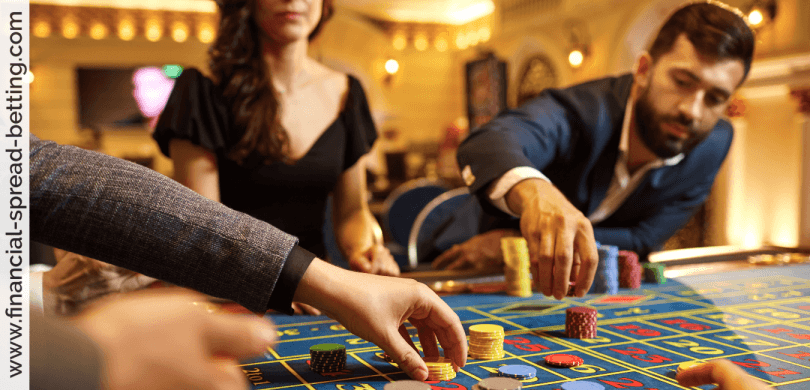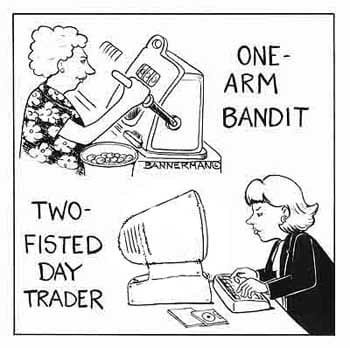I’m often asked what it takes to become a successful high-stakes gambler. “Do I have what it takes?” people want to know. It’s difficult to answer this question, because no matter how well I think I know someone, I don’t know him well enough to be able to make this assessment. The only person who can possibly do that is the one asking the question, and then only if he is brutally honest with himself.
Many writers make winning at gambling sound easy. Don’t believe them. I’m here to tell you flat out that becoming a professional big-time gambler is a gruelling and psychologically demanding process. The reason I use the word ‘process’ is that the successful gambler is constantly evolving, adapting, and changing as circumstances dictate. He is perpetually evaluating opportunities, weighing risk/reward ratios, and exercising proper discipline. Most importantly he must have a high tolerance for ambiguity.
For the professional gambler, the coming day’s outcome is never clear. Although he knows he has the best of it, on any given day he can’t depend on winning. Every professional gambler, whether he’s a blackjack or poker player, a sports bettor, or a horse handicapper, will inevitably have losing streaks. If you play as long as I have, some of those losing streaks will be horrendous. I once had 14 consecutive losing weekends at a major Las Vegas Strip hotel playing blackjack in a good double-deck game. I lost 1,458 units in the space of 3 ½ months. Had I not had so much success prior to this streak, I’m that even I would have started questioning whether blackjack was a profitable game. It didn’t seem so at the time. I checked and rechecked my tables. I carefully studied each losing session, reviewing the dealers, the playing conditions, my betting patterns, and so forth. Was I pressing too hard? Was I steaming? Was my bet spread adequate? Did I still have a positive mental outlook? Was there something in my personal life I was bringing with me to the tables?
I methodically rules out each variable. The only thing I could pinpoint was that my confidence had decreased to the point where I wondered if I would ever win there again. This being the case, I took a break – not from blackjack, but from playing at this particular casino. For the next couple of months I played my blackjack trade elsewhere (while turning down several juicy invitations to special events at my nemesis casino). I won steadily and my confidence returned.
Then I revisited the casino from hell. In the end I won more money at that joint than at any other. Playing at least six days a month for a couple of years, I remained completely unmolested. Even though I consistently booked large wins, the casino personnel never forgot that losing steak. They believed it was only a matter of time before it happened again. And they were right. Had they waited long enough, as long as a lifetime, it’s likely such a losing streak would have repeated itself. As it turned out, my wins were so overwhelming that upper management finally sat up and took notice. Scrutiny increased dramatically, and when a pit-boss friend of mine tipped me off to the fact that my days there were numbered, I left for greener pastures.
I was lucky. Very lucky. Not lucky to have won back all my money plus a lot more – the laws of probability controlled that outcome. No, I was luck that I’d had enough experience, and had made enough money prior to encountering this gambling nightmare, that I was prepared to deal with its financial and psychological consequences. Even then it was damned difficult. Had it happened early in my career, I surely would have been wiped out financially. Psychologically, would I have had the will to raise a new stake and try again? That’s hard to say. It’s a rhetoric question, but I believe I would have pressed on. The mathematics of the game are so compelling that ultimately logic would have prevailed and I would have continued playing.
But the point is this: Every player, regardless of how skilled he is and how good the playing conditions are, will eventually have a gut-wrenching losing streak. Probably several. The laws of probability mandate these losing streaks just as surely as they also mandate that you’ll win overall. I’m not just talking about a couple of losing trips; I mean real carnage to both bankroll and psyche. How you deal with it when it happens will determine whether you’ve got what it takes to be a pro.
Big-time winners tend to have certain traits in common. To be sure, not every top pro possesses all these characteristics, but lacking any of them represents a weakness that will probably cause trouble at some point in their careers. Following is a list of these critical traits:
- High interpersonal competence
- A positive attitude toward gaming and life
- Soft-focus concentration
- Likableness, charm
- High tolerance for ambiguity
- Ability to detect micro-expressions
- Highly observant and alert
- Slow to anger
- Good table presence
- Self-confident – slow to doubt own abilities
- Disciplined and controlled
- Flexible, adaptable, resilient
- Take good care of boy and mind
- Maintains proper diet
- Avoids alcohol and drugs
- Self-effacing – ego needs under control
Although most of these traits are self-explanatory, a few words of clarification are in order for several.
High Interpersonal Competence
First and foremost is interpersonal competence, which means a person’s skills in interacting with others. The most successful gamblers I know are open, friendly, charming, and well-liked. They go out of their way to avoid offending others. They are highly tolerant of other viewpoints and they avoid arguing. They are also good listeners.
People like knowing that someone has really heard what they’ve said. By using active listening techniques, the skilled communicator paraphrases what another says, so the speaker knows he’s been heard correctly. It doesn’t matter if the skilled listener agrees or not; by being able to accurately state another person’s position, he ingratiates himself. Let me give you an example.
Suppose someone is going on about how cruel it is that people in some cultures eat dogs. Whether you agree with this statement or view this practice as a cultural issue to be resolved by the indigenous people has no bearing on how you apply your skills as a listener. You might say something like, “You’d like me to know that the practice of eating dogs seems repugnant to you. You view it as cruel and inhumane and in your opinion it should be prohibited.” Notice that you’ve neither agreed or disagreed with the statement. You have, instead, clearly articulated the person’s position, so he knows he’s been heard.
You’ll be amazed how effective this technique is in casino situations. Dealers regularly complain to me about floor personnel, and floor personnel complain to me about casino managers. I listen to their beefs so they know they’ve been heard, without condemning or condoning what they say. Because they do not feel threatened or put down, they usually continue to open up to me. I often hear about their personal situations, even about other job offers they are considering – dangerous stuff to be bantering about in their current job setting. Of course, I never betray any confidences.
Also, I never offer gratuitous advice. If I’m asked for advice, I demur. “Well, I’m not sure,” I’ll say. “What do you think the best approach would be?” Then I switch back to listening mode, giving them the opportunity to hear what they’re saying, which enables them to refine their thinking and find their own action path. The key here is that the problem is theirs, and I help them think through possible solutions without volunteering answers.
People are remarkably grateful for someone who will listen to them. This technique goes a long way toward cementing solid relationships with casino personnel, which are as important now as always.
In addition to sophisticated listening skills, the successful gambler possesses what has been called “table presence”. He smiles readily, has an open posture, and alertly leans forward. He makes eye contact with the other players and casino personnel, nods while listening to others talk, and lightly touches others on the arm when appropriate. To help you remember of these qualities, think of the acronym S-O-F-T-E-N:
- Smiling
- Open posture (arms and legs uncrossed)
- Forward learning
- Touching (briefly and lightly)
- Eye contact
- Nodding while listening


